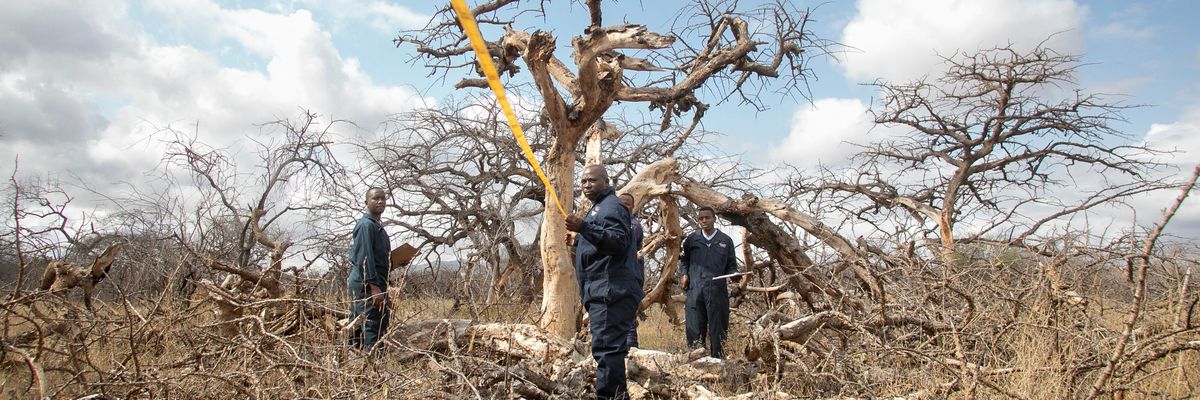Echoing previous warnings from climate advocates and studies, an environmental watchdog on Friday released research from experts at the University of California which shows that trying to offset fossil fuel emissions with popular forest carbon credit projects "is a pipe dream."
As the new Berkeley Carbon Trading Project assessment—funded by Carbon Market Watch (CMW)—explains, "The voluntary carbon market generates credits, each nominally equivalent to one metric ton of carbon dioxide reduced or removed from the atmosphere, from a wide range of projects around the globe."
Critics have long argued that carbon credit schemes are "false solutions" that harm poor communities where such projects are based and enable companies worldwide to greenwash their polluting activity rather than implementing reforms or investing in action to actually combat deforestation and the climate emergency.
"Reducing Emissions from Deforestation and Forest Degradation (REDD+) is the project
type that has the most credits on the voluntary carbon market—about a quarter of all credits to date," the assessment details. "These projects pay governments, organizations, communities, and individuals in forest landscapes
(primarily tropical ones in the Global South) for activities that preserve forests and avoid forest-related greenhouse gas (GHG) emissions."
Over the past two decades, more than $3 billion has been poured into REDD+ and nearly half a billion carbon credits have been awarded, yet "deforestation is still continuing at an alarming rate," the report notes. Berkeley researchers' analysis of four methodologies that have generated almost all REDD+ credits—under Verra, the largest voluntary carbon market registry—revealed that estimated GHG emissions reductions were dramatically exaggerated.
"We found significant over-crediting from all of the factors we reviewed, the core causes of which are a combination of incentives and uncertainty," said Barbara Haya, who led the research. "Everyone involved in the voluntary carbon market, from the buyers and sellers of credits, to the registries who write the rules and the auditors who enforce them, all benefit from more credits."
"Large uncertainty in climate benefit calculations creates many opportunities for market participants to choose assumptions that inflate credits issued," Haya added. "Drawing on all evidence, we conclude that REDD+ is ill-suited for carbon offsetting."
As a CMW briefing published with the assessment summarizes:
- Project baselines are significantly overestimated, the research found, leading to the creation of carbon credits that represent imaginary emission reductions.
- Similarly, leakage is systematically underestimated by projects, which make use of flexibilities provided to them by the methodologies to downplay the risk of deforestation moving to areas outside of their project.
- The creation of low-quality carbon credits is further fueled by exaggerated estimates of the quantity of carbon stored within the trees that are protected by projects.
- The risk that the trees protected by REDD+ projects will die in the future is also drastically underestimated by projects, which again use methodological flexibility to misrepresent the real deforestation threat that forests will face in the future.
- Finally, the safeguards implemented by Verra are weak, do not protect communities from harm, and are not properly upheld by the validation and verification bodies.
Verra
released a lengthy response to the new assessment, which welcomed "the insight of the broader scientific and environmental community into our work on nature-based solutions," but also said that "it is important to note that the vast majority of findings and recommendations from this research align with extensive and systematic work to update the Verified Carbon Standard (VCS) Program that Verra has carried out over the last two years."
Inigo Wyburd, a CMW policy expert on global carbon markets, said that "we welcome Verra's willingness to engage with our research and hope that it will take on board our findings and implement all of our recommendations."
"Businesses are offsetting their emissions on the cheap by buying low-quality carbon credits connected to forest protection projects in the Global South," the expert added. "When only 1 in every 13 carbon credits represents a real emissions reduction, their action is lost in the forest."
Meanwhile, as Gilles Dufrasne, CMW's policy lead on global carbon markets, highlighted, "biodiversity, the climate, and Indigenous people or local communities are losing out on what should have been a system to drive meaningful financial flows to the forest conservation projects that so desperately need it."
"Offsetting should be axed," he argued. "It cannot work in its current form, and carbon markets must evolve into something different. The focus should be on getting money to the right place, rather than getting as many credits as possible."
As Patrick Galey, senior fossil fuels investigator at Global Witness, pointed out on social media Friday, the new research was released as the African nation Liberia is preparing to sign an offsetting agreement conceding 10% of its territory to Blue Carbon, a private company in the United Arab Emirates led by a member of an Emirati royal family.
Middle East Eye reported late that month that the deal for "control of one of the most densely forested territories" on the continent "would violate a number of Liberian laws, including the 2019 land rights law." Additionally, as CMW policy expert Jonathan Crook told the outlet, "there's no clarity as to what will be done to calculate what emission reductions have taken place."

